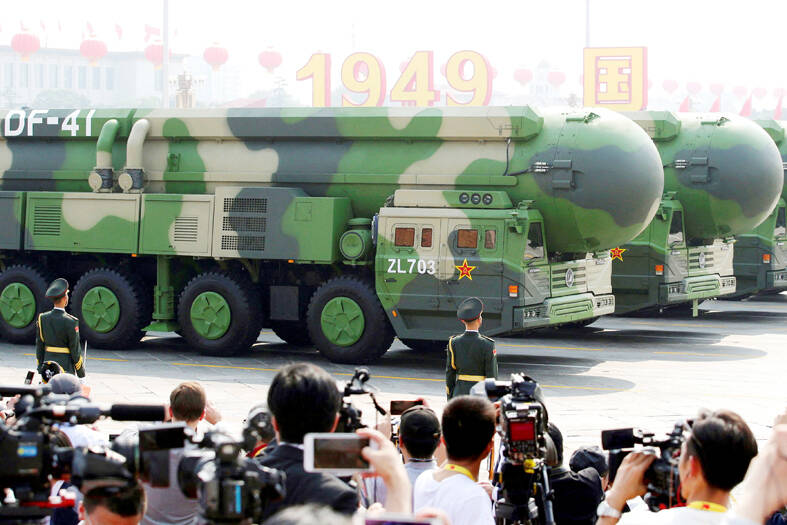China said it test-launched an intercontinental ballistic missile (ICBM) yesterday, firing it into the Pacific Ocean in its first such exercise in decades.
The launch sparked protests from countries in the region, with Japan saying it had not been given advance notice and expressing “serious concern” about Beijing’s military buildup.
In Taipei, the Ministry of National Defense (MND) said it detected “intensive” Chinese missile firing and other drills, but did not give details.

Photo: Reuters
Beijing has stepped up its nuclear development and boosted defence spending over the past few years, with the Pentagon warning in October last year that China was developing its arsenal more quickly than the US had anticipated.
China held more than 500 operational nuclear warheads as of May last year and is likely to have more than 1,000 by 2030, it said.
The Chinese People’s Liberation Army Rocket Force “launched an ICBM ... carrying a dummy warhead to the high seas in the Pacific Ocean at 8:44 on Sept. 25, and the missile fell into expected sea areas,” the Chinese Ministry of National Defense said in a statement.
An analyst said such tests were rare.
“This is extremely unusual and likely the first time in decades that we’ve seen a test like this,” Carnegie Endowment for International Peace Stanton senior fellow Ankit Panda said.
The test “likely speaks to China’s ongoing nuclear modernization manifesting in new requirements for testing,” he added.
Japan said it was given “no notice from the Chinese side in advance,” with a government spokesman adding that Beijing’s military buildup was a “serious concern.”
Australia said it was seeking “an explanation” over the launch.
New Zealand also said the launch of the missile, which landed in the South Pacific, was “an unwelcome and concerning development.”
The MND said it had detected 23 Chinese military aircraft, including J-16 fighters and drones, operating around Taiwan carrying out long-range missions to the southeast and east of the nation.
Taiwan has dispatched its own air and naval forces to keep watch, it said.
Additional reporting by Reuters

CHAOS: Iranians took to the streets playing celebratory music after reports of Khamenei’s death on Saturday, while mourners also gathered in Tehran yesterday Iranian Supreme Leader Ayatollah Ali Khamenei was killed in a major attack on Iran launched by Israel and the US, throwing the future of the Islamic republic into doubt and raising the risk of regional instability. Iranian state television and the state-run IRNA news agency announced the 86-year-old’s death early yesterday. US President Donald Trump said it gave Iranians their “greatest chance” to “take back” their country. The announcements came after a joint US and Israeli aerial bombardment that targeted Iranian military and governmental sites. Trump said the “heavy and pinpoint bombing” would continue through the week or as long

TRUST: The KMT said it respected the US’ timing and considerations, and hoped it would continue to honor its commitments to helping Taiwan bolster its defenses and deterrence US President Donald Trump is delaying a multibillion-dollar arms sale to Taiwan to ensure his visit to Beijing is successful, a New York Times report said. The weapons sales package has stalled in the US Department of State, the report said, citing US officials it did not identify. The White House has told agencies not to push forward ahead of Trump’s meeting with Chinese President Xi Jinping (習近平), it said. The two last month held a phone call to discuss trade and geopolitical flashpoints ahead of the summit. Xi raised the Taiwan issue and urged the US to handle arms sales to

BIG SPENDERS: Foreign investors bought the most Taiwan equities since 2005, signaling confidence that an AI boom would continue to benefit chipmakers Taiwan Semiconductor Manufacturing Co’s (TSMC, 台積電) market capitalization swelled to US$2 trillion for the first time following a 4.25 percent rally in its American depositary receipts (ADR) overnight, putting the world’s biggest contract chipmaker sixth on the list of the world’s biggest companies by market capitalization, just behind Amazon.com Inc. The site CompaniesMarketcap.com ranked TSMC ahead of Saudi Aramco and Meta Platforms Inc. The Taiwanese company’s ADRs on Tuesday surged to US$385.75 on the New York Stock Exchange, as strong demand for artificial intelligence (AI) applications led to chip supply constraints and boost revenue growth to record-breaking levels. Each TSMC ADR represents

Pro-democracy media tycoon Jimmy Lai’s (黎智英) fraud conviction and prison sentence were yesterday overturned by a Hong Kong court, in a surprise legal decision that comes soon after Lai was jailed for 20 years on a separate national security charge. Judges Jeremy Poon (潘兆初), Anthea Pang (彭寶琴) and Derek Pang (彭偉昌) said in the judgement that they allowed the appeal from Lai, and another defendant in the case, to proceed, as a lower court judge had “erred.” “The Court of Appeal gave them leave to appeal against their conviction, allowed their appeals, quashed the convictions and set aside the sentences,” the judges